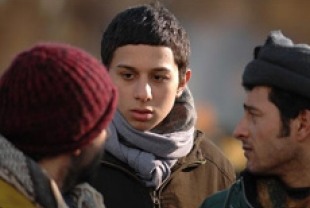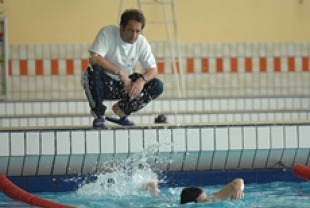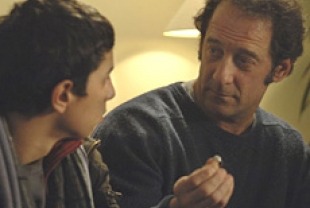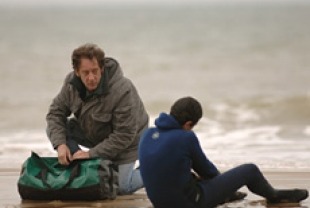The rise in nonwhite immigration particularly from the Muslim world has empowered far right parties across Europe that feed on racial hatred. They want to "close the doors" to stem the tide of poor people who they think will put too much pressure on schools, hospitals, and public housing. One result is that England has become the promised land for refugees from all over the world who are attracted to the country's generous welfare system and the dream of building a future there. The quest to start a new life compels them to take great risks stowing away in trucks and on tops of the wheel assemblies of freight trains.
Both the hatred of immigrants and the dangers they are willing to endure form the background of French filmmaker Philippe Lioret's astonishing film Welcome. It takes place in Calais, France, where people can look across the water and see the English coastline. The story revolves around the friendship between a middle-aged swimming coach and a young Kurd who has escaped from Iraq and spent three months on the road before reaching Calais.
Simon (Vincent Lindon) teaches swimming at a local pool and is in the process of finalizing a divorce from Marion (Audrey Dana), a schoolteacher who spends her spare time working at a soup kitchen which feeds the many hungry and homeless undocumented refugees in the city. She blows a fuse when she sees some immigrants being thrown out of a supermarket for upsetting customers. Marion is unhappy with Simon as he just stands by and doesn't support her in her protest against this injustice. "Do I need to buy you a history book?" she asks her ex-husband, referring to the same kind of persecution and bigotry espoused by the Nazis against the Jews.
At the swimming pool, Simon meets Bilal (Firat Ayverdi), a 17-year-old Kurdish refugee who wants to take swimming lessons. He is living on the street with other illegal immigrants in what is called "the jungle." One of the things Bilal is most thankful for is the chance to take a shower, something denied his compatriots. This young Kurd has alienated a small group of them by breaking down on a truck when he had to put a bag over his head to escape a CO2 detector at an inspection point. He later admits to another Kurd that he is terrified of bags after having to keep one over his head for days when he was detained in Turkey.
As a last resort, Bilal has decided to swim across the English Channel and he needs to improve his swimming skills. When Simon guesses this is why he is taking lessons, he tries to convince him of the folly of his plan. After Simon offers Bilal and his friend lodging for the night at his apartment, the young man shares his dream of going to England to marry Mina (Derya Ayverdi), another Kurd, and to play soccer for Manchester United since back in Iraq he was a champion player. Simon can empathize with both aspects of this young man's yearnings: he was once a sports star and he still loves Marion even though she is now with another man. That is the reason why their pairing and journey together against the tide of public opinion in Calais is so endearing.
Welcome is one of the best films of 2010 with its incisive examination of the spiritual practice of hospitality. Of course, to be kind and open-hearted to refugees in Calais is to risk censure by bigoted neighbors (like the one who lives opposite Simon and ironically has a "Welcome" mat outside his apartment door), to be harassed by the police, and perhaps to even be put in prison for five years for helping them. Simon identifies with Bilal's courageous escape from a life of war and chaos in Iraq, his yearning for a better life in England, his desire to be reunited with his beloved, and his dream of playing soccer.
Writer and director Philippe Loiret has done a remarkable job drawing out our empathy for Bilal and Simon. The latter discovers his own yearning to be helpful, even if only in a small way. Openness and hospitality are pathways to a better life, although it is not always what we expect.
Special features on the DVD include a Short Film, The Berlin Wall, by Paul Cotter. Welcome was nominated for 10 César Awards, including Best Film, Best Director, and Best Actor, and was named Best Picture by the 2010 Lumiere Awards.



